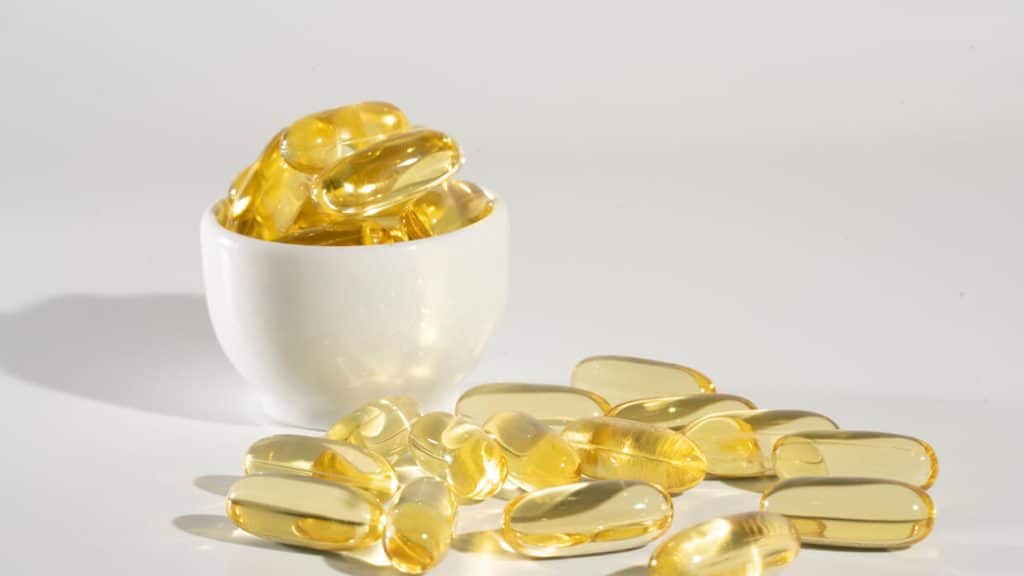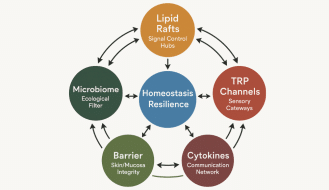Fish Oil vs Omega 3: What’s the Difference?
Fish oil and omega-3. The two words often get tossed around interchangeably. But as you may have guessed, fish oil and omega 3 are not actually the same thing. They stand for specific concepts.
For folks who are interested in reaping the health benefits of omega-3s, it’s important to be aware of the differences in these terms. So let’s take a closer look at fish oil vs omega 3, how they compare, and what to look for in a supplement.
What Is Omega-3?
Omega-3 refers to a group of fatty acids that we need to get from our diet. From a chemistry perspective, a fatty acid is considered to be a type of omega-3 if it has a double bond between the 3rd and 4th carbon atom.
There are lots of omega-3s – over 60 different types and counting. But when people talk about omega-3 fatty acids, they’re usually just referring to a few members of the polyunsaturated fatty acids group. You might have heard about the two most famous ones:
- Eicosapentaenoic acid – EPA
- Docosahexaenoic acid – DHA
Why You Should Care About EPA and DHA
In the last 50 years, almost all omega-3 research has focused on EPA and DHA and their respective health benefits.
Notably, EPA and DHA have anti inflammatory properties. Because they help reduce inflammation, they’re sought after for many chronic inflammatory conditions, like rheumatoid arthritis or auto-immune diseases [1]. Studies show that when people get an effective omega-3 dose, it can help reduce pain long-term.
EPA and DHA also help the body maintain healthy arteries, thanks to their ability to reduce arterial stiffness and clotting [2].
You may have also heard about the benefits of omega-3s for the eyes and brain. That’s because DHA makes up about 15% of the fatty acids in the prefontral cortex of the brain and about 50-70% of the fatty acids in the rod outer segments of the retina [3, 4].
And that is not all. EPA and DHA influence our cell’s ability to communicate with other cells and how our genes express themselves [4]. Because of all of these vital functions, EPA and DHA are essential for our cells to function their best.

Go fish: The most potent types of omega-3s are found in fatty fish and fish oil. Plant-based omega-3s, like flaxseed, contain a different kind of omega.
Dietary Sources of Omega-3s
As good as omega-3s are for us, they can be hard to come by. EPA and DHA are found plentifully in fatty fish, like salmon, sardines, and mackerel. But other seafood doesn’t contain nearly as much. That means, if you primarily eat shrimp, whitefish like tilapia, or even certain types of canned tuna, you may not be getting what you need in the omega-3 department.
There’s also not much EPA and DHA in plant-based foods. Flaxseed oil, chia seeds, and other plant-based omega-3s contain a different type of omega-3 fatty acid, called alpha linolenic acid (ALA). ALA is beneficial in its own right, but it doesn’t have the same effects as EPA and DHA. There’s also less research about how it works generally, compared to EPA and DHA.
Because EPA and DHA come from relatively few dietary sources, it’s easy to understand why an estimated 95% of Americans have low levels. For this reason, many people turn to taking fish oil supplements to increase their omega-3 intake.
What Is Fish Oil?
Fish oil is what it sounds like. It’s oil that comes from fish.
Fish oil typically comes from small-catch fish like anchovies, sardines or small mackerel. However, you can also get fish oil derived from other fish sources, like salmon or cod liver.
Fish oil is a rich source of all omega-3s – and especially of the EPA and DHA fatty acids. But omega-3s make up only part of the fats found in fish oil. Unless the oil has been chemically modified and concentrated, about 30% of the total fish oil in dietary supplements will be EPA and DHA [4]. The remaining 70% is a broad mixture of other types of omega-3s, as well as other polyunsaturated fatty acids, monounsaturated fatty acids, and saturated fatty acids.
Salmon oils and cod liver oil supplements typically contain a lower percentage of omega-3s compared to fish oils made from small fish, like anchovies and sardines. Depending on factors like the salmon species, time of harvest, and whether the fish was farm raised or wild caught, about 12% – 15% of the salmon oil will be made up of EPA and DHA. In cod liver oil, the number is usually between 18% – 25% [5].
How Much Omega-3 Are You Getting in Your Fish Oil Supplements?
This percentage discussion isn’t just about splitting hairs. This information is really important because, when it comes to omega-3s, dose = results.
Many fish oil supplements advertise that they deliver 1000 mg of fish oil per capsule. That sounds like a big dose, until you realize that only 30% of that fish oil is made up of EPA/DHA. That means in reality, you only get 300 mg EPA/DHA per capsule.
For people who are trying to get enough omega-3s to improve their triglyceride levels, lower blood pressure, or reduce inflammation, much higher doses are needed – usually on the order of 2000 – 4000 mg of EPA/DHA daily [6]. That would be the same as taking at least 7 – 14 regular fish oil capsules every day.

How many servings, exactly? With regular fish oil pills, you’d need 7 – 14 capsules daily to get an effective dose of EPA and DHA.
Liquid Versus Capsules
Compared to the pill form, taking fish oil in liquid form can make it easier to get an effective omega-3 dose. There’s not that much space in a fish oil capsule (a lot of it is gelatin). So when you go for liquid, you can get more omega-3s in a single serving.
For example, one tablespoon of Omega Cure® fish oil provides a full 3000 mg of EPA/DHA daily dose. Added into juice or yogurt or enjoyed by itself, it’s a lot easier to swallow than an equivalent 10 capsules!
While liquid fish oil is less common in the USA, it’s long been a staple in northern European countries, like Iceland and Norway.
Omega-3 Concentrates
In an effort to address the dosage issue, many supplement manufacturers have now created omega-3 concentrates from fish oil. These supplements may contain as much as 90% of either EPA, DHA or a combination of both. This allows people to get a higher level of those specific fatty acids in fewer servings.
While omega-3 concentrates sound great on paper, they have some notable issues. To create the omega-3 concentrates, the manufacturer has to chemically modify the fatty acids into ethyl esters. Studies show that these modified fatty acids can be less bioavailable (meaning, they don’t absorb into the body as well) [7].
Another issue with omega-3 concentrates is that you don’t get as full a range of fatty acids. As noted above, EPA and DHA represent just two types of omega-3s. While EPA and DHA are certainly powerful and very important, the body is complex and needs a full range of fatty acids to work well. For example, today, there’s a lot of excitement about docosapentaenoic acid, or DPA, for heart and brain health [8]. DPA is naturally found in fish oils, alongside EPA and DHA. But if a concentrated supplement just focuses on EPA or DHA, then you may lose out on DPA benefits.
To get a full range of omega-3s, including EPA and DHA, it’s best to look for full-spectrum fish oil supplements. You want to get one that is non-winterized (i.e. not skimmed). Just like extra-virgin olive oil, a non-winterized oil will provide a fuller range of fatty acids compared to more processed fish oils.
Less processing, more benefits: Full-spectrum liquid fish oils provide a greater range of beneficial fatty acids compared to regular omega-3 supplements.
Benefits of Getting Enough Omega-3s
As mentioned above, omega-3 fatty acids are vital for our cells to work their best. So it’s no wonder that getting enough of these essential fatty acids is linked with a lower risk of many diseases.
Research shows that people with higher omega-3 levels are less likely to suffer from ischemic stroke, coronary heart disease, high blood pressure, mood disorders, and dementia, to name just a few conditions [2, 9, 10]
For pregnant women, more omega-3s also make it less likely that they’ll experience pregnancy complications from preterm birth.
Not to mention, people with the highest omega-3 levels enjoy 5 more years of life on average [11].
Measure Your Omega-3 Levels
Since these fatty acids are so important, it’s wise to check if you are getting enough from your diet or supplements. You can take an omega-3 index test to measure the amount of EPA and DHA that’s actually found in your red blood cells.
Most Americans have low levels of omega 3 fatty acids that put them at a higher risk for coronary heart disease and other health issues. However, even if that’s you, you can correct it by regularly eating oily fish or by taking a high quality fish oil supplement.
Is Fish Oil the Same As Omega 3?
To sum it all up, fish oil contains omega-3s. But omega-3s represent only a portion of the fats that make up a natural fish oil.
With any fish oil supplement, it’s important to look at how much omega-3 you actually get per serving and assess whether that’s enough to meet your wellness goals. Once you start checking the nutrition facts for the EPA and DHA content per serving, you’ll be well on your way to making better health decisions.
Fish Oil Designed to Cover Your Omega-3 Needs
For those who don’t want to swallow umpteen fish oil pills, there’s Omega Cure Extra Strength. Designed by physicians, Omega Cure Extra Strength provides 3000 mg of EPA/DHA per serving. As a fresh, full-spectrum fish oil, it’s easy to drink.
Best of all, because you are getting an effective omega-3 dose in each shot, you get to experience the difference that fish oil can make for you.
An Effective Omega-3 Dose, Made Simple
Experience the Omega3 Innovations difference for yourself with the most effective fish oil supplement on the market.
Buy Now
References:
1. Hahn, J., Cook, N. R., Alexander, E. K., Friedman, S., Walter, J., Bubes, V., Kotler, G., Lee, I. M., Manson, J. E., & Costenbader, K. H. (2022). Vitamin D and Marine Omega 3 Fatty Acid Supplementation and Incident Autoimmune Disease: VITAL Randomized Controlled Trial. BMJ (Clinical research ed.), 376, e066452. https://doi.org/10.1136/bmj-2021-066452
2. O’Keefe, J. H. et al. (2024). Omega-3 Blood Levels and Stroke Risk: A Pooled and Harmonized Analysis of 183 291 Participants From 29 Prospective Studies. Stroke, 55(1), 50–58. https://doi.org/10.1161/STROKEAHA.123.044281
3. McNamara, R. K. (2010). DHA Deficiency and Prefrontal Cortex Neuropathology in Recurrent Affective Disorders. The Journal of Nutrition, 140(4), 864-868. https://doi.org/10.3945/jn.109.113233.
4. Calder, P. (2018). Very Long-Chain N-3 Fatty Acids and Human Health: Fact, fiction and the Future. Proceedings of the Nutrition Society, 77(1), 52-72. doi:10.1017/S0029665117003950
5. R, A. et al. (2021). The Employment of Analytical Techniques and Chemometrics for Authentication of Fish Oils: A Review. Food Control, 124. https://doi.org/10.1016/j.foodcont.2021.107864.
6. Singer, P., Richter, V., Singer, K., & Löhlein, I. (2021). Analyses and Declarations of Omega-3 Fatty Acids in Canned Seafood May Help to Quantify Their Dietary Intake. Nutrients, 13(9), 2970. https://doi.org/10.3390/nu13092970
7. Cholewski, M., Tomczykowa, M., & Tomczyk, M. (2018). A Comprehensive Review of Chemistry, Sources and Bioavailability of Omega-3 Fatty Acids. Nutrients, 10(11), 1662. https://doi.org/10.3390/nu10111662
8. Byelashov, O. A., Sinclair, A. J., & Kaur, G. (2015). Dietary Sources, Current Intakes, and Nutritional Role of Omega-3 Docosapentaenoic Acid. Lipid Technology, 27(4), 79–82. https://doi.org/10.1002/lite.201500013
9. Luo, C. & Chen, Z. (2022) Is Omega-3 Index Necessary for Fish Oil Supplements for CVD risk Prevention? Cardiology Plus 7(2):p 70-76. doi: 10.1097/CP9.0000000000000015
10. Antao, H. S., Sacadura-Leite, E., Bandarra, N. M., & Figueira, M. L. (2023). Omega-3 Index as Risk Factor in Psychiatric Diseases: A Narrative Review. Frontiers in Psychiatry, 14, 1200403. https://doi.org/10.3389/fpsyt.2023.1200403
11. IMIM (Hospital del Mar Medical Research Institute). (2021). Higher Levels of Omega-3 Acids in the Blood Increases Life Expectancy by Almost Five Years. ScienceDaily. www.sciencedaily.com/releases/2021/07/210722113004.htm
Popular posts



Related posts







